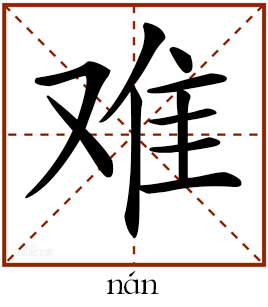Difficult

This Chinese character means “difficult,” usually used to describe problems that are hard to solve or setbacks that make a situation worse.
世上无难事 只怕有心人
shì shàng wú nán shì zhǐ pà yǒu xīn rén
Generally meaning “where there is a will, there is a way,” this idiom emphasizes the importance of factors such as faith, motivation, determination and persistence in the pursuit of success and happiness.
Chinese history is flush with anecdotes of famous persons achieving their goals according to this wisdom.
The eminent poet Li Bai of the Tang Dynasty (618-907) is a good example. When Li was young, he did not love reading books and was quite playful. One day, he went out to play as usual. An old woman was grinding an iron pestle by the riverside. Li asked her what she was doing. The old woman replied, “I am grinding the iron pestle into a needle.” In surprise, Li said, “How is that possible? Is it possible for an iron pestle to be worn into a needle?” The old woman replied, “As long as there is perseverance, the iron pestle can become a needle.” Her words gave Li an epiphany. A moment of insight suddenly flashed into his mind. He understood that with strong will, even the most difficult thing can be achieved. After that, he read diligently and finally became a great poet.
The story of Chinese historian Sima Qian also illustrates the importance of strong-mindedness. He is most noted for his authorship of the Shiji (Records of the Grand Historian), which is considered the first comprehensive and systematic history of China. The book took him 18 years to finish and the process was full of hardship. Before he could complete this work, Sima Qian deeply offended the emperor in a political incident. He was arraigned for “defaming the emperor” and was condemned to castration. During the West Han Dynasty (202 BCE-8 CE), it was customary for officials charged of high crimes either to commit suicide or buy their way out of trouble.But in order to complete his work, Sima Qian suffered the cruel indignity of castration rather than commit suicide. After unremitting labor he realized his lifelong ambition and finished the Records of the Grand Historian. This great work bears witness to his arduous life and indomitable spirit.
edited by BAI LE
